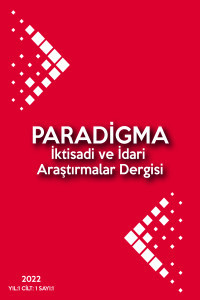Tarih, Ütopya ve Siyaset: Martin Buber ve Ernst Bloch’un Aktif Mesiyanizmi
Mesiyanizm, Ütopya, Siyaset, Martin Buber, Ernst Bloch
History, Utopia and Politics: The Active Messianism of Martin Buber and Ernst Bloch
Messianism, Utopia, Politics, Martin Buber, Ernst Bloch,
___
- Bloch, Ernst. (2000). The Spirit of utopia. Meridian.
- Bloch, Ernst. (2006). Dışavurumculuğun tartışılması. F. Jameson (Ed.), Estetik ve Politika (ss. 29-52) içinde. Alkım.
- Buber, Martin. (1996). Pats in ütopia. Syracuse University Press.
- Cohen, Hermann. (1995). Religion of reason: out of the sources of Judaism. An American Academy of Religion Book.
- Löwy, Michael. (1980). Jewish Messianism and libertarian ütopia in Central Europe (1900-1933). New German Critique, no. 20/2.
- Löwy, Michael. (1992). Redemption and utopia: Jewish libertarian thought in Central Europe. Stanford University Press.
- McCole, John. (1993). Walter Benjamin and the antimonies of tradition. Cornell University Press.
- Rabinbach, Anson. (1985). Between enlightenment and apocalypse: Benjamin, Bloch and modern Jewish Messianism. New German Critique, no. 34.
- Rabinbach, Anson. (1997). In the shadow of catastrophe: German intellectuals between apocalypse and enlightenment. Stanford University Press.
- Scholem, Gershom. (1995). Towards an understanding of the messianic idea in judaism. The Messianic Idea in Judaism and Other Essays on Jewish Spirituality. (ss. 1-37) içinde. Shocken.
- Scholem, Gershom. (1995). The Messianic idea in Judaism: And other essays on Jewish spirituality. Schocken.
- Tönnies, Ferdinand. (2019). Cemaat ve cemiyet, Vakıfbank Kültür Yayınları.
- Weber, Max. (1967). Ancient Judaism. Free Press.
- Yayın Aralığı: Yılda 2 Sayı
- Yayıncı: Gümüşhane Üniversitesi
ENFLASYONUN İŞLETMELERİN FİNANSAL FAALİYETLERİNE VE FİNANSAL ORANLARINA ETKİSİNİN TEORİK ÇERÇEVESİ
Muhammed Asım KANTAR, Turan ÖNDEŞ
Bir Devlet Tipi Olarak Patrimonyal ve Neopatrimonyal Devlet Kavramlarının İmkanı
Selcuk KENDİRLİ, Muhammed Veysel YILDIRIM
Tarih, Ütopya ve Siyaset: Martin Buber ve Ernst Bloch’un Aktif Mesiyanizmi
Artür Yetvart MUMCU, Refika BAKOĞLU
KİŞİLİK ÖZELLİKLERİNİN POLİTİK DAVRANIŞLAR ÜZERİNE ETKİSİNDE ALGILANAN ETİK İŞ İKLİMİNİN ROLÜ
İmalat İşletmelerinin Çevre Koruma Uygulamalarının Performanslarına Etkisinin Belirlenmesi
